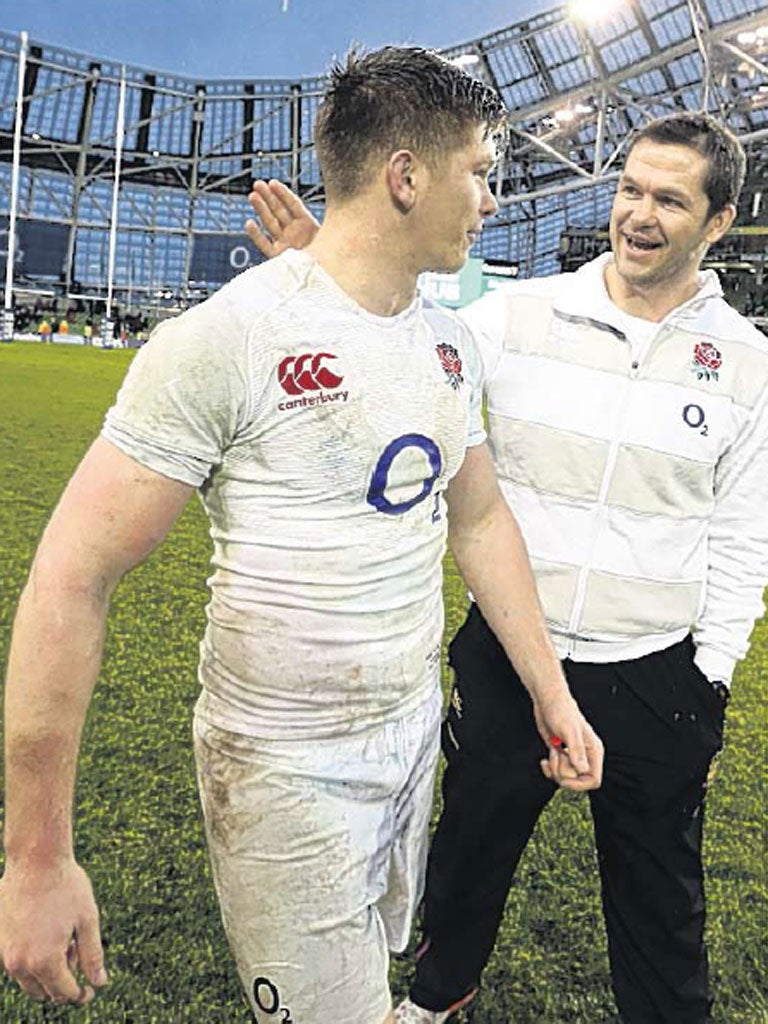Six Nations: Coach Andy Farrell salutes young England side's 'masterclass' on occasion made for the experienced campaigners
England beat Ireland 12-6 in Dublin

Your support helps us to tell the story
From reproductive rights to climate change to Big Tech, The Independent is on the ground when the story is developing. Whether it's investigating the financials of Elon Musk's pro-Trump PAC or producing our latest documentary, 'The A Word', which shines a light on the American women fighting for reproductive rights, we know how important it is to parse out the facts from the messaging.
At such a critical moment in US history, we need reporters on the ground. Your donation allows us to keep sending journalists to speak to both sides of the story.
The Independent is trusted by Americans across the entire political spectrum. And unlike many other quality news outlets, we choose not to lock Americans out of our reporting and analysis with paywalls. We believe quality journalism should be available to everyone, paid for by those who can afford it.
Your support makes all the difference.The third quarter of a tight Test match is traditionally the time when the eventual winners make their pitch: down the decades, the All Blacks have made it their business to put opponents to the sword in the 20 minutes after half-time and keep twisting the blade until the blood runs cold. Yesterday, a pumped-up Ireland chose this precise moment to go after England – but were repulsed.
No one in the vicinity of Lansdowne Road was more impressed than Andy Farrell, the red-rose backs coach, who "majors" on defence. "That was the turning point," said the great rugby league player, whose contribution to the union game in England may, in the final reckoning, be seen as every bit as considerable.
"In that third quarter we were making back-to-back errors. But the way we came through it was a masterclass. For a young side to do that against opponents who had been there and done it so many times was outstanding, because an occasion like that was made for the likes of Brian O'Driscoll and Ronan O'Gara, who really know how to get through these games. It was a credit to everyone involved."
Farrell was just about the perfect man to talk about the abstractions and immeasurables of a contest in which precise technical skills and clever tactical ruses were, if far from irrelevant, even further from the whole story. England's first Six Nations victory in Dublin for a decade was hammered out on a different anvil in a different forge: the one where guts and soul and spirit are the principal products.
At times, there were players dotted all over the field, being treated by medical teams forced to split up into small units as a means of sharing the workload. If the Irish came off worst in the body count – the wing Simon Zebo, so thrillingly inventive in the opening weekend victory over Wales in Cardiff, broke a bone in his foot and will miss the rest of the championship; Jonathan Sexton, the best outside-half in Europe, was helped from the field with a nasty hamstring injury – there was a significant spillage of blood in both camps.
In such an environment, then, it was asking a great deal of an England pack with only two members in the 20-cap category to quieten and quell such seasoned and accomplished forwards as Rory Best, Sean O'Brien and the reigning Lions No 8 Jamie Heaslip. It was asking even more of a freshly-minted midfield axis to square up to Sexton and those two magisterial centres of the modern Irish era, Gordon D'Arcy and Brian O'Driscoll.
Yet the England eight finished ahead of the game, despite finding themselves on the wrong end of a green-shirted resurgence at the start of the second half. "It defines you as a group, winning a game like this away from home," said a straight-faced forwards coach Graham Rowntree, who, like the former head coach Andy Robinson before him, has a habit of appearing really miserable when he is in fact very happy.
As for the midfielders, they over-achieved to a spectacular degree. Owen Farrell's appetite for what the tennis professionals call the "clutch points" in a match has been well established for a while, but even he played above and beyond expectation here.
When the England team gathered in a circle to await the appearance of the home side, it was the Saracens player who did all the talking. When he was hurt in the opening exchanges after being clattered in the act of sending up a high kick for Chris Ashton to chase, he did not for a second wonder whether he was in the right condition to kick for goal when a penalty was awarded moments later. Disguising a limp, he hit the "middle of the middle", to borrow a phrase from the former England coach Dave Alred, and set the scoreboard rolling.
Outside him, Billy Twelvetrees and Brad Barritt squared up to their illustrious opponents on the gain line and refused to concede ground. D'Arcy was in one of his more frenzied moods – at one point, he ran 40 metres to tell the England front-rowers that they had just been outscrummaged, as if they didn't already know – while O'Driscoll, who celebrated the birth of daughter Sadie just before kick-off, was in full warpaint. Yet neither Irishman could make a significant impact on proceedings.
For Mike Catt, the England attacking skills coach, the enjoyment was counter-intuitive: there were precious few silk-woven skills on display, give or take the odd flash of class from the outstanding Alex Goode. Did Catt care? Did he hell. "That," he said, "was a massive learning curve for us. To win in these circumstances, under those challenges? At international level, that's what it's all about."
Join our commenting forum
Join thought-provoking conversations, follow other Independent readers and see their replies
Comments